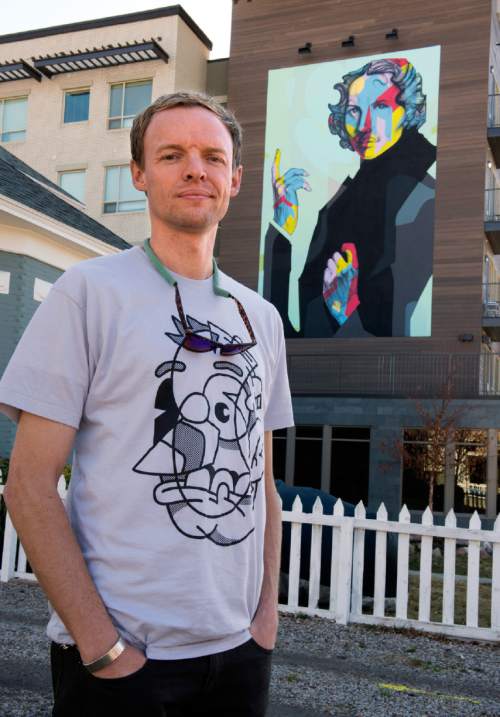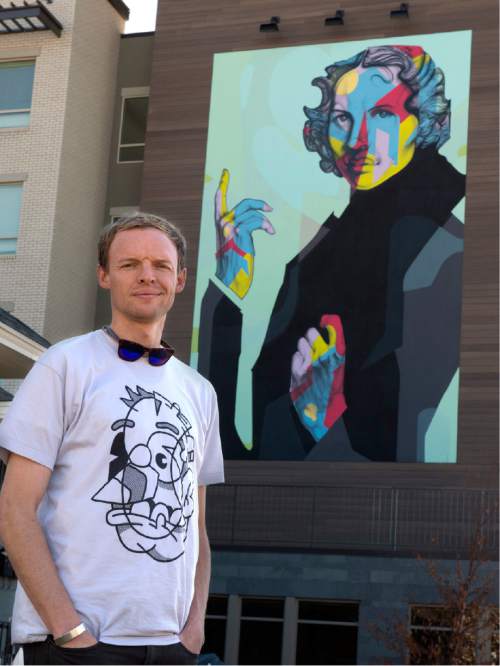This is an archived article that was published on sltrib.com in 2015, and information in the article may be outdated. It is provided only for personal research purposes and may not be reprinted.
Most of her old homes are gone but a kindly landlady from another era still looks over the Salt Lake City neighborhood she cherished.
Thelma McDonald's clear, friendly eyes peer down now from a multistory mural, her smile captured from a family photo and painted on the side of an innovative apartment project called North Sixth, nestled on 600 West near North Temple.
Aging bricks and mortar have been bulldozed from most of the west-side block, replaced by modern architecture and new shops. But through personal ties, tax credits and progressive thinking, an Ogden developer brought in much-needed affordable housing while preserving a human touch that once defined McDonald's corner of the city.
The story centers on a widow described as beautiful, strong and caring — someone who quietly improved the lives of people around her.
"There is something very special about an unsung hero, somebody who did remarkable things especially for her time," said artist Chuck Landvatter, who painted the impressionistic portrait for the project's developer, Giv Group.
McDonald was left destitute in 1955, when her husband died in a car accident, her daughter Sharon said. The West High graduate and mother of two made her way by opening a boardinghouse.
With no other source of income, she threw herself into renting and home repairs while accumulating some small savings. As neighbors on the block gradually moved away, McDonald started buying their brick homes and converting them into additional rentals.
"The bank didn't want to loan money to women in those days," said Sharon, who lives in Bountiful with Bob Martines, her husband of 58 years. "A determined lady, my mother was. Any nook and cranny, she rented out. She ended up buying the whole block."
Nine homes in all, with up to 17 rentals. The family even towed two old Bamberger rail cars onto the property at one point and rented those. McDonald walked the neighborhood every day for nearly 40 years, greeting tenants drawn from the city's workforce in those days. Dishwashers. Day laborers. Students. Retired railroad workers.
"We met some really nice people,'' Sharon said.
Photos show McDonald's houses strung together along 600 West like a brightly colored necklace, their exteriors in fine repair and their yards neatly trimmed.
"That was my mother's block," her daughter said. "She's part of Salt Lake."
When McDonald died in 1996 at age 81, her descendants labored to keep the rentals going, even as longtime landowners in nearby Depot District put their properties on the market amid a wave of development.
McDonald's family considered selling, too, but turned away offers as they weighed how to honor Thelma's legacy and retain the block's character.
"She was one of a kind,'' her daughter said. "We wanted a real tribute, not just any overnight developer."
Drawn by the area's charm and excellent transit access, the Giv Group saw potential for a housing project on the block, one that kept affordable rentals and some of the neighborhood's old flavor, company co-founder Chris Parker said.
"Those sorts of communities are part of the state's history, with a kind of collected experience that used to be the norm," explained Parker, who struck up a friendship with Sharon and her husband and eventually bought the properties in 2013. The developer opted to build a five-story complex on the block's southern end, leaving four homes to the north standing.
Known for renewal in urban corridors, Giv Group ultimately secured about $10 million in state and federal tax breaks to build the $16 million North Sixth project, which opened last year.
"They are good folks," Sharon said of Parker and his colleagues. "They've looked out for the middle- and working-class people."
Across from Bridges at Citifront, North Sixth has 115 one- and two-bedroom apartments, 86 of them rent-subsidized, along with ground-level retail outlets — all in keeping with McDonald's vision of a thriving neighborhood connected to its blue-collar roots. Some things, Parker said, don't have to change.
"Living downtown," he said, "is the best opportunity for someone who doesn't have a lot of money to still live a good life."
North Sixth's open design and its street-level stores are meant to engage residents and their surroundings, the developer said. "Vibrant cities need diversity,'' he said, "and North Sixth does a pretty good job of re-creating that."
McDonald's daughter believes Thelma would be happy with the results. "This," she said, "is her legacy."





